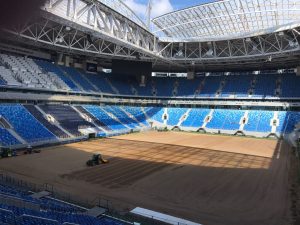Thought Leadership: SOS Global’s Michael Tenenbaum explores transport logistics ahead of 2018 World Cup

SOS Global Managing Director Michael Tenenbaum
In a new series of special Thought Leadership articles, SVG Europe’s Platinum sponsors explore a significant issue or event in detail, in the process setting out their thoughts and expectations for a development that has industry-wide impact. In the first of the series, SOS Global managing director Michael Tenenbaum addresses transport logistics challenges in the run-up to one of 2018’s most important sporting events – the World Cup in Russia.
——
“Getting cargo onto a plane, vessel or truck bound for Russia can be simple. The real challenge begins once the cargo arrives and needs to be customs-cleared – specially for temporary processes with delivery deadlines. For World Cup 2018 there are two recommended procedures: Carnet ATA and SPSE (Special Procedure for Sport Events). Only entities listed by FIFA are allowed to use the much simpler SPSE. Remaining companies with the intention of temporarily importing goods into Russian territory would be well advised to use Carnet ATA.
To explain this procedure in more detail, Carnet ATA is an international customs and temporary export-import document. It is used to clear customs in 87 countries and territories without paying duties and import taxes on merchandise that will be eventually re-exported. For temporary imports into Russia, process with Carnet ATA has been, to date, the most efficient tool. It is important to note that Russia has made significant progress since the early stages of its ATA membership, with improvements measured by reviews from the United States Council for International Business (USCIB), the World Customs Organisation (WCO) and the World Trade Organization (WTO).
Nonetheless, there are special considerations that are very specific to this country and which need to be taken into account:
– Ideally, the Carnet should be translated into Russian
– There are a limited number of customs offices able to clear Carnet ATA
– In case of temporary imports of broadcasting equipment, a special permit of the Russian Federal Service for Supervision of Communications, Information Technology and Mass Media (Roskomnadzor) is required
– For the customs clearance of intellectual property it is necessary to submit to the Russian Customs Agency a letter of permission obtained from the trademark owner
– The carnet itself needs to be issued accurately; serial numbers, weights, etc, must match exactly

Preparations ahead of the recent FIFA Confederations Cup, around which SOS Global provided its usual range of comprehensive logistics services.
As mentioned before, SPSE is a much easier process with considerably fewer requirements. After the Russian customs gathered experiences during the Confederations Cup, it is to be expected that requirements will be further simplified. Important points to note:
– It only applies to companies and entities listed by FIFA
– Only a simple Commercial Invoice is needed
– Even though it is not confirmed officially, it is expected that Roskomnadzor and Trademark Registration will no longer be necessary. Definitive confirmation is expected by the beginning of 2018
It remains to be seen where there will be simplification to the Carnet ATA procedure.
‘Fully prepared’
With most temporary imports having ultimately been cleared in Moscow in the past, Russian custom border offices (road and sea) are fully prepared to handle this special procedure. SOS Global will have its own staff on the border to support and chaperone the whole process.
Russian customs have already shown to be very supportive during the Olympic Winter Games in Sochi in 2014. We expect a similar mindset for the World Cup 2018. Having said that, it is important to comply with all legal requirements. If all documents are available, the clearance process will be quick and effective. If not, you can manoeuvre yourself very quickly into a deadlock.
SOS Global has been preparing itself for this challenge. We have been in contact with the LOC and Russian Customs for more than a year, in the process establishing the neuralgic points to be taken into consideration for a smooth cargo operation.
When it comes to transportation, trucking between Europe and Russia is exposed to the greatest possible fluctuations. The political environment, including embargo policy, has a direct impact on supply and demand of vehicles on the market. In addition, the Rouble exchange rate has been quite a rollercoaster lately. All of this leads to a very unstable market in which pricing is very difficult to forecast.
Another specific challenge revolves around the trading routes between Russia and the UK. Increasingly strict requirements for Baltic, Russian and Belarusian haulers have severely limited the number of drivers allowed to enter the UK. The current offer is so limited that options such as trans-loading in continental Europe are required.
Specialist support
The issues raised above are just a few of those to be taken into consideration in order to secure a successful cargo operation at the 2018 World Cup. Therefore it is strongly recommended that companies needing to get equipment and supplies to Russia seek the support of a specialist.
The number of knowledgeable event logistics freight forwarders is relatively small, whilst the officially appointed forwarder will be extremely busy. Accordingly, my best piece of advice is to prepare yourself early and secure the services of a knowledgeable partner.
Needless to say, the SOS Global team has done its homework and is ready to support its customers as it has done during World Cup tournaments for the last 30 years.

